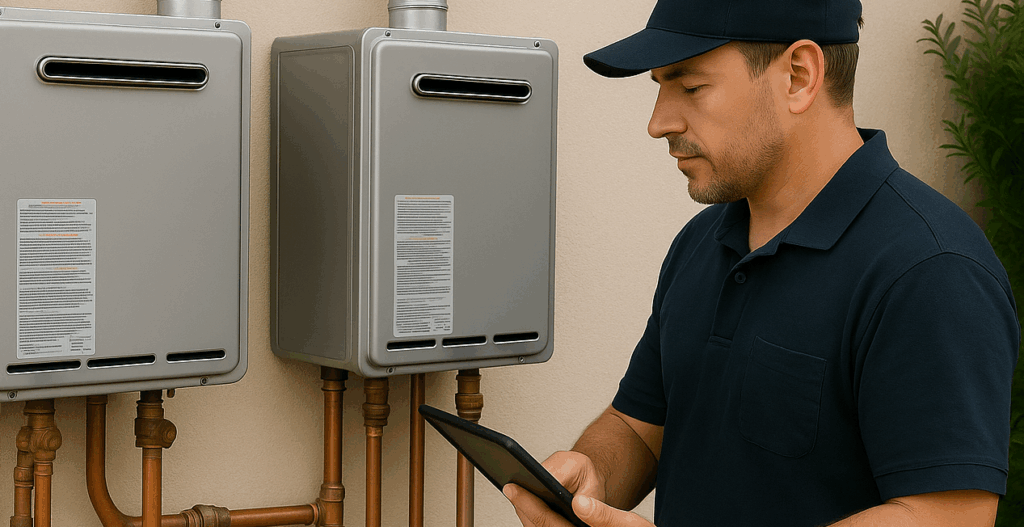A hot shower at the end of a long day is one of life’s simple pleasures. But when your water heater fails, the comfort and convenience you rely on disappears often when you least expect it. Preventing sudden breakdowns is entirely possible with a little regular attention and smart maintenance. Whether you have a traditional tank or a modern tankless model, caring for your water heater is easier than you might think. Here’s your complete guide to keeping hot water flowing and expensive repairs at bay.
Get to Know Your Water Heater
Start by understanding what type of water heater you have – tank or tankless, electric or gas. Each style has unique needs, so review your user manual and learn the basics of operation and safety features. If you’ve never checked your water heater before, take a look at the pipes, valves, and controls so you know what’s normal and what’s not. Familiarity is your best defense against unexpected problems.
Lower the Thermostat
Most water heaters are preset to 140°F (60°C), but you rarely need water that hot. Setting your thermostat to 120°F (49°C) is not only safer for your skin but also reduces stress on the heater and prevents mineral buildup inside the tank. Lower temperatures mean less risk of scalding, slower corrosion, and energy savings – plus, your heater won’t have to work as hard day in and day out.
Flush the Tank Annually
If you have a storage tank water heater, minerals and sediment from your water supply can accumulate inside over time. This buildup can make your unit less efficient, cause strange noises, and eventually lead to leaks or failure. Experts recommend flushing your tank at least once a year to remove this sediment. Here’s how:
- Turn off the power supply or set your gas heater to “pilot.”
- Attach a garden hose to the drain valve at the base of the tank.
- Open the valve and let several gallons flow into a bucket or drain.
- Close the valve, remove the hose, and restore power.
Regular flushing helps your heater run more smoothly, extends its lifespan, and lowers your risk of breakdowns.
Inspect the Anode Rod
Inside most tank water heaters is an anode rod – a metal rod that attracts minerals and prevents rust from forming inside the tank. Over time, the rod dissolves and loses effectiveness. Check the anode rod every 2-3 years (more frequently if you have hard water). If the rod is less than half an inch thick or coated with calcium, replace it. This simple step can add years to your heater’s life and prevent costly leaks.
Test the Pressure Relief Valve
Safety first! Your water heater has a pressure relief valve that opens if pressure or temperature inside the tank gets too high. Test it once a year to ensure it’s working:
- Place a bucket under the discharge pipe.
- Carefully lift the valve’s lever and let some water out.
- If water keeps flowing or the valve leaks afterward, replace it immediately.
A working valve protects your home from dangerous pressure buildup and a possible explosion.
Check for Leaks and Corrosion
Regularly inspect the area around your water heater for puddles, drips, or rusty spots. Look for leaks at pipe joints, the base of the tank, and around the temperature and pressure relief valve. Even a slow drip can lead to major water damage and costly repairs if left unaddressed. If you spot any signs of trouble, call a licensed plumber promptly to investigate and fix the issue.
Insulate the Tank and Pipes
Heat loss from your tank and pipes forces your water heater to work harder. Wrapping your water heater with an insulating blanket especially if it’s in a cold basement or garage can significantly improve efficiency. Likewise, insulating the first several feet of hot and cold water pipes reduces heat loss and helps prevent freezing in winter. Insulation is an affordable upgrade that pays off in energy savings and a longer-lasting heater.
Clean Around the Heater
Keep the area around your water heater clear of boxes, bags, and debris. Good airflow helps prevent overheating and reduces fire risk. For gas models, ensure the burner compartment and vents remain unobstructed. If dust or lint accumulates, gently vacuum or wipe it away. Clean surroundings are an easy but often overlooked part of water heater care.
Install a Water Softener if Needed
Hard water is notorious for causing mineral deposits inside water heaters, reducing their efficiency and increasing the risk of failure. If your area has hard water, consider installing a water softener. This device removes calcium and magnesium, protecting your plumbing, appliances, and water heater from scale buildup. Though it’s an investment, a softener can dramatically extend your water heater’s life and reduce maintenance costs.
Be Alert to Warning Signs
Unusual noises (rumbling, popping, or banging), rusty or cloudy water, fluctuating water temperatures, and rising energy bills are all signs your water heater may need attention. Don’t ignore these red flags – addressing issues early can prevent breakdowns and save you from expensive emergency repairs. When in doubt, call a professional plumber to inspect your system.
Schedule Annual Professional Maintenance
Even with diligent DIY care, there’s no substitute for an expert tune-up. A licensed plumber can flush your tank more thoroughly, inspect the anode rod, test the pressure valve, check the thermostat, and examine all electrical or gas connections. Regular professional servicing catches small issues before they become big problems and helps your water heater deliver reliable performance year after year.
Consider a Replacement When It’s Time
No water heater lasts forever. Most tank models last 8-12 years, while tankless units can reach 15-20 years with proper care. If your heater is nearing the end of its expected life, or if you’re facing frequent repairs, it may be more cost-effective to replace it with a new, more efficient model. Modern water heaters use less energy, recover faster, and often come with better safety features.
A little attention goes a long way when it comes to water heater care. By following these easy tips – flushing the tank, lowering the thermostat, inspecting key components, and scheduling regular maintenance – you can prevent most breakdowns and enjoy reliable hot water all year long. Not only will you save money on repairs and energy bills, but you’ll also enjoy the peace of mind that comes with a well-maintained home. If you ever have questions or spot signs of trouble, don’t hesitate to call a professional. With the right care, your water heater can serve you faithfully for many years to come.

